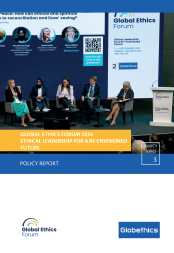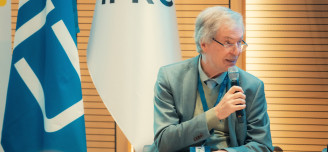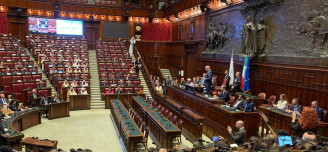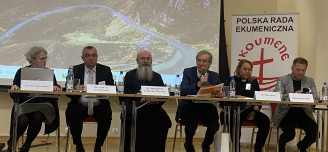Higher education's role in peacebuilding
Peace is high on the current political agenda. Amidst rising polarisation and conflicts around the globe, people, nations, and decision-makers are called to intensify their efforts in developing solutions for peaceful and sustainable conditions of living together. At first sight, higher education may not be perceived to be at the forefront of this public engagement. The Aurora International Peace Conference, however, has proven this perception wrong.
Amélé Ekue represented Globethics at the four-day conference, which was hosted by the University of Innsbruck, Austria, from 17 to 21 February 2025 and brought together more than 300 participants from 22 countries. The international conference was filled with interdisciplinary insights on peacebuilding through educational lenses and, most importantly, a series of hands-on, practical workshops demonstrating the innovative contribution to peacebuilding of educators, researchers and students from various countries, also beyond the Aurora constituency.
Rethinking the Classroom from Lived Experience of Conflict Prevention

The opening was a compelling keynote by Ian S. Manzi of Rwanda, affiliated with Georgetown University’s Collaborative of Global Children’s Issues. Drawing from his personal experience as a second-generation survivor of the Rwandan genocide, Manzi emphasised the need for higher education to act as a bridge between academic institutions and communities. He stressed that peacebuilding expertise arises not only from scholarly knowledge but also from lived experiences and local wisdom, making universities key actors in creating sustainable and context-sensitive solutions to conflict.
“I am a peace-farmer,” he declared, convincing the audience with his transgenerational and grassroots approach to working through trauma with children and young people who have not witnessed the atrocities of violence themselves but ‘inherited’ them from their parents, and – perhaps because of this seemingly contradictory nexus – constitute the true guardians of knowledge and custodians of change. Like farmers who sow seeds with the expectation of future harvests, peacebuilders need to continuously nurture such attitudes and resources from a very young age for a peaceful living together. Keeping the memory of the past is not a passive act of remembering but a forward-looking, creative act of shaping the future together.
His vision of memory as a creative and forward-looking act was echoed by Beatrix Austin of the Berghof Foundation, who reinforced the idea that higher education should not only inform minds but also form peacemakers equipped to shape a more peaceful future.
Let’s Make Peace: Educational Initiatives for Sustainable Peace
The Aurora Peace Conference was uniquely designed to allow participants to take part in a plethora of workshops on educational peace initiatives. These workshops gave multifaceted insights: for example, on the creation of urban gardens, Permahaven, at the Business School of Copenhagen, as spaces of hands-on learning on sustainability and peace and the promotion of regenerative practices. Another workshop invited participants to learn about the production and screening of documentary films as resources for peace training using the example of decolonisation in South Africa.
Claudia Maya Zapata from the German-Colombian Peace Institute shared insights on “peace slams” in Colombia, where community voices, stories, and performance art challenge dominant conflict narratives and foster meaningful exchanges between academia and local actors.
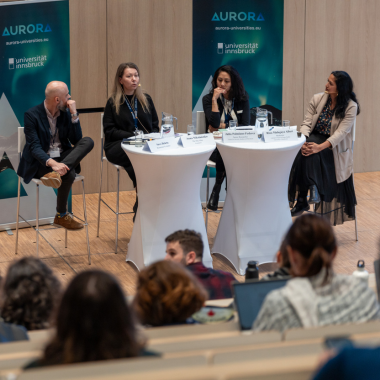
Another highlight of the conference was the Peace-by-Peace project, presented by students from the University of Amsterdam College. This youth-led initiative gathers stories of young peacebuilders worldwide to inspire peer-led change. Emphasising action, accountability, and authenticity, the students advocated for practical and disruptive engagement in peace efforts. As one participant expressed, peace is not just an external goal – it must be cultivated within. Their message was clear: to be a peacebuilder, you don’t need credentials – just humanity.
Learning Peace during Times of Atrocities and Learning What it Means to be Human
Ukrainian Nobel Peace Prize laureate and human rights lawyer Oleksandra Matviichuk emphasised that the core mission of higher education is to teach what it means to be human. Reflecting on the war in Ukraine, she highlighted the erosion of democratic values and the blurred lines between truth and falsehood. She called for education to take on three key responsibilities: defending human dignity, rethinking what we teach in the face of mass violence, and responding deeply to the question of how we remain human. “You always teach who you are,” she reminded, urging a shift from transactional education to one grounded in shared humanity.
Looking ahead, the next Aurora Peace Conference will take place in 2026 at Vrije Universiteit Amsterdam. Globethics continues to contribute to global peacebuilding through partnerships, research, and educational offerings – including its online course on Interreligious Cooperation for Peace, its peacebuilding library, and related publications.
About Aurora
Aurora is an alliance of nine European universities, among which are leading research institutions such as the Vrije Universiteit (VU) Amsterdam and Palacky University Olomouc in the Czech Republic. Aurora was established in 2016 by research-intensive institutions of higher education to harness their academic excellence for positive societal transformation. In their collaboration through joint research projects, student and faculty mobility, as well as community engagement programmes, the Aurora Alliance emphasises innovation in alignment with the Sustainable Development Goals. Aurora places great value on inclusion and diversity, and on the involvement of students in shaping the learning and research environments.
